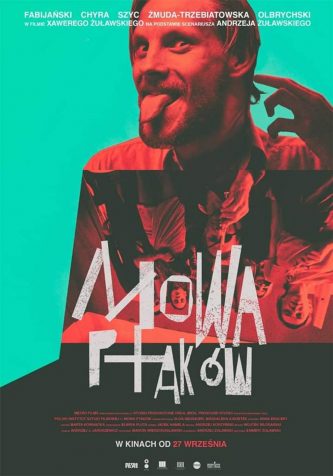 The final script written by Poland’s late Andrzej Zulawski (1940–2016). Unfortunately Zulawski died before it could be filmed, leaving the job to his son Xawery. Xawery Zulawski’s previous films CHAOS (2006) and SNOW WHITE AND RUSSIAN RED (2009) aren’t up to the heights of his father’s filmography (which includes hysterical masterworks like DIABEL, POSSESSION and SZAMANKA), and neither, for that matter, is 2019’s BIRD TALK (MOWA PTAKOW).
The final script written by Poland’s late Andrzej Zulawski (1940–2016). Unfortunately Zulawski died before it could be filmed, leaving the job to his son Xawery. Xawery Zulawski’s previous films CHAOS (2006) and SNOW WHITE AND RUSSIAN RED (2009) aren’t up to the heights of his father’s filmography (which includes hysterical masterworks like DIABEL, POSSESSION and SZAMANKA), and neither, for that matter, is 2019’s BIRD TALK (MOWA PTAKOW).
The subject is modern-day Poland, which as viewed by the Zulawskis is in extremely bad shape. The film is a rarity in the elder Zulawski’s cannon in that it takes place in the present day, and wears its politics on its sleeve. Andrzej Zulawski had by his own admission learned early on in his career that to make his points he was better off couching them in historical and/or genre themed narratives, but he evidently had a change of heart in his final years.
The setting is modern day Warsaw. There, after a confrontation with several anti-Semitic students in his classroom, a high school teacher is fired from his job. He later strikes up a friendship with the girl whose iPhone footage of his actions sealed his fate. Said girl is an aspiring filmmaker who uses her iPhone to make vérité films.
The filmmaking angle is furthered by Marian, a young moviemaker. Marian’s ageing father, like Xawery’s, used to be a film director but is now, according to Marian, an “ogre” living in a “fairy tale world of his own,” which from what I’ve heard accurately described Andrzej Zulawski’s final years.
That the old man is representative of Andrzej Zulawski is further evident in a scene in which his fictional doppelganger is seen watching the elder Zulawski’s POSSESSION, and describes the plot of Zulawski’s LA FIDELITE, which he claims “might be his last film” (in fact, LA FIDELITE was the penultimate film directed by Andrzej Zulawski). We also meet Ola, a pregnant Victoria Beckham wannabe living in obscene luxury while her businessman hubbie Mr. Jacek is going stir crazy in his office, located within a dehumanizing glass building.
It all leads to a crazed odyssey of bad behavior that includes violent political demonstrations, a self-castration, an attempted assassination, a graveyard set music video segue (not an especially good artistic choice) and much excess hysteria.
Xawery Zulawski makes a sincere attempt at emulating the legendary excess of his father’s cinema in a film whose overall impression is much like those of one of Andrzej Zulawski’s lesser efforts: energetic and outrageous yet also long winded and lugubrious. Certain scenes capture the hysteria specialized in by the elder Zulawski, but Xawery tends to utilize fish eye lenses, upside-down compositions, etc. to impart what his father was able to conjure up far more organically.
The elder Zulawski’s touch is nonetheless evident, mostly in the heavily stylized dialogue, which is packed with cultural and artistic references that don’t always register in English. Xawery also makes sure his father’s presence is felt by playing the synth score by Stanislas Syrewicz from the elder Zulawski’s 1985 film L’AMOUR BRAQUE (and also 1986’s BIGGLES: ADVENTURES IN TIME) over one scene.
Visually the film is marked by handheld camerawork that literally never stops moving and a pell-mell editing scheme that freely intercuts footage shot through cell phones and iPods—young people spending too much time on cell phones being one of the Zulawskis’ primary critiques of modern-day Poland. In furthering that critique Xawery Zulawski makes sure to include numerous close-ups of various historical mementos, plaques and figurines to show how far Poland has strayed from its WWII-era history of heroic resistance. Where the country currently is, according to this movie, is in a quagmire of ultra-right wing political sentiment and youthful frivolity, with the good old days far in the past.
Vital Statistics
BIRD TALK (MOWA PTAKOW)
Metro Films/Studio Orka/MX35/Polski Instytut Sztuki Filmowej
Director: Xawery Zulaswki
Producer: Marcin Wierzchoslawski
Screenplay: Andrzej Zulawski
Cinematography: Andrzej J. Jaroszewicz
Editing: Wojciech Wlodarski
Cast: Sebastian Fabijanski, Eryk Kulm, Jasmina Polak, Katarzyna Chojnacka, Sebastian Pawlak, Andrzej Chyra, Zaneta Palica, Borys Szyc, Marta Zmuda Trzebiatowska, Daniel Olbrychski, Michal Grudzinski, Monika Niemczyk, Michal Wanio, Bartosz Obuchowicz, Wiktor Zborowski
